前一节我们明白了maven是个什么玩意,这一节就来讲讲他的一个重要的应用场景,也就是通过maven将一个ssh项目分割为不同的几个部分独立开发,很重要,加油
--WZY
一、maven父工程与子模块的拆分与聚合原理
问题描述:将ssh工程拆分为多个模块开发
1.1、拆分原理
创建一个maven project(pom),然后在创建三个子模块(maven moudule),其中三个子模块,分别为 dao、service、web,也就是将三层的内容分别独立为一个项目,进一步将耦合性降低,其中如何将他们连接起来了,看下图。
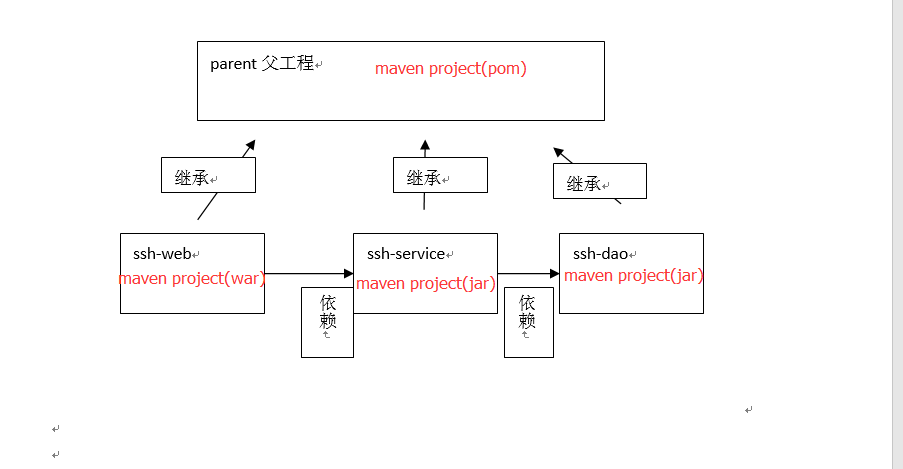
为什么需要创建parent父工程来管理其下三个子模块呢?并让其子模块继承他呢?
继承是为了消除重复,如果将dao、service、web分开创建独立的工程则每个工程的pom.xml文件中的内容存在重复,比如:设置编译版本、锁定spring的版本的等,可以将这些重复的配置提取出来在父工程的pom.xml中定义
将三层都独立分开来了,web层如何调用service层代码?service层又如何调用dao层的代码呢?
这个在没有maven之前是不可以这样做的,但是有了maven一切都不一样了,web层调用service层的代码其实很简单,因为service是一个完整的项目,那么我们在web层这个项目中想要使用别得项目中的代码,只需要通过maven的pom.xml文件编写对应的坐标,将其jar包加入进来即可达到目的,因此,看图中,ssh-web依赖ssh-service,ssh-service依赖ssh-dao,其中的原理就是我说的这样,所以才能将这三层分开成独立的项目,并且进一步抽取其公有依赖的jar包,统一交由父工程来管理,这就maven带来的效果。
1.2、聚合原理
项目开发通常是分组分模块开发,每个模块开发完成要运行整个工程需要将每个模块聚合在一起运行,比如:dao、service、web三个工程最终会打一个独立的war运行
二、案例实现
问题描述:使用maven将ssh项目进行分模块,并且实现从web到dao层的数据的存取进行实验
2.1、创建maven-parent父模块

点击next
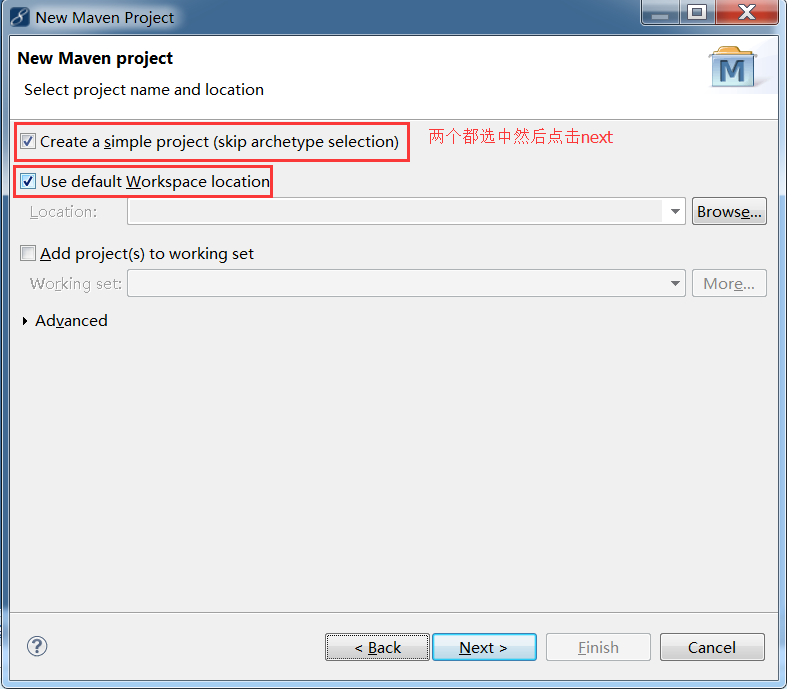
点击next

创建好之后的父工程如图

从它的目录结构可以看出,父工程本身不写代码,它里面有一个pom.xml文件,这个文件可以将多个子模块中通用的jar所对应的坐标,集中在父工程中配置,将来的子模块就可以不需要在pom.xml中配置通用jar的坐标le、
在父工程的pom.xml中抽取一些重复的配置的,比如:锁定jar包的版本、设置编译版本等,一般这种都不需要我们自己临时配置,网上或者公司都有已经写好了的,每次使用就直接丢过来即可。下面给一个我收藏的额。嘿嘿

<project xmlns="http://maven.apache.org/POM/4.0.0" xmlns:xsi="http://www.w3.org/2001/XMLSchema-instance" xsi:schemaLocation="http://maven.apache.org/POM/4.0.0 http://maven.apache.org/xsd/maven-4.0.0.xsd">
<modelVersion>4.0.0</modelVersion>
<groupId>com.wuhao.sshtest</groupId>
<artifactId>ssh_parent</artifactId>
<version>0.0.1-SNAPSHOT</version>
<packaging>pom</packaging>
<!-- 为了确定每个框架的版本号 -->
<!-- 锁定版本 -->
<properties>
<spring.version>4.2.4.RELEASE</spring.version>
<struts2.version>2.3.24</struts2.version>
<hibernate.version>5.0.7.Final</hibernate.version>
<slf4j.version>1.6.6</slf4j.version>
<log4j.version>1.2.12</log4j.version>
<shiro.version>1.2.3</shiro.version>
<cxf.version>3.0.1</cxf.version>
<c3p0.version>0.9.1.2</c3p0.version>
<mysql.version>5.1.6</mysql.version>
</properties>
<!-- 锁定版本,struts2-2.3.24、spring4.2.4、hibernate5.0.7 -->
<dependencyManagement>
<dependencies>
<dependency>
<groupId>org.springframework</groupId>
<artifactId>spring-context</artifactId>
<version>${spring.version}</version>
</dependency>
<dependency>
<groupId>org.springframework</groupId>
<artifactId>spring-aspects</artifactId>
<version>${spring.version}</version>
</dependency>
<dependency>
<groupId>org.springframework</groupId>
<artifactId>spring-orm</artifactId>
<version>${spring.version}</version>
</dependency>
<dependency>
<groupId>org.springframework</groupId>
<artifactId>spring-test</artifactId>
<version>${spring.version}</version>
</dependency>
<dependency>
<groupId>org.springframework</groupId>
<artifactId>spring-web</artifactId>
<version>${spring.version}</version>
</dependency>
<dependency>
<groupId>org.hibernate</groupId>
<artifactId>hibernate-core</artifactId>
<version>${hibernate.version}</version>
</dependency>
<dependency>
<groupId>org.apache.struts</groupId>
<artifactId>struts2-core</artifactId>
<version>${struts2.version}</version>
</dependency>
<dependency>
<groupId>org.apache.struts</groupId>
<artifactId>struts2-spring-plugin</artifactId>
<version>${struts2.version}</version>
</dependency>
</dependencies>
</dependencyManagement>
<dependencies>
<dependency>
<groupId>org.apache.httpcomponents</groupId>
<artifactId>httpclient</artifactId>
<version>4.4</version>
</dependency>
<dependency>
<groupId>com.alibaba</groupId>
<artifactId>fastjson</artifactId>
<version>1.1.37</version>
</dependency>
<dependency>
<groupId>commons-beanutils</groupId>
<artifactId>commons-beanutils</artifactId>
<version>1.9.1</version>
</dependency>
<!-- <dependency>
<groupId>org.quartz-scheduler</groupId>
<artifactId>quartz</artifactId>
<version>2.2.1</version>
</dependency> -->
<dependency>
<groupId>commons-fileupload</groupId>
<artifactId>commons-fileupload</artifactId>
<version>1.3.1</version>
</dependency>
<!-- jstl -->
<dependency>
<groupId>jstl</groupId>
<artifactId>jstl</artifactId>
<version>1.2</version>
</dependency>
<!-- shiro -->
<!-- apache shiro dependencies -->
<!-- <dependency>
<groupId>org.apache.shiro</groupId>
<artifactId>shiro-all</artifactId>
<version>${shiro.version}</version>
</dependency> -->
<!-- spring -->
<dependency>
<groupId>org.aspectj</groupId>
<artifactId>aspectjweaver</artifactId>
<version>1.6.8</version>
</dependency>
<dependency>
<groupId>org.springframework</groupId>
<artifactId>spring-aop</artifactId>
<version>${spring.version}</version>
</dependency>
<dependency>
<groupId>org.springframework</groupId>
<artifactId>spring-context</artifactId>
<version>${spring.version}</version>
</dependency>
<dependency>
<groupId>org.springframework</groupId>
<artifactId>spring-context-support</artifactId>
<version>${spring.version}</version>
</dependency>
<dependency>
<groupId>org.springframework</groupId>
<artifactId>spring-web</artifactId>
<version>${spring.version}</version>
</dependency>
<dependency>
<groupId>org.springframework</groupId>
<artifactId>spring-orm</artifactId>
<version>${spring.version}</version>
</dependency>
<dependency>
<groupId>org.springframework</groupId>
<artifactId>spring-beans</artifactId>
<version>${spring.version}</version>
</dependency>
<dependency>
<groupId>org.springframework</groupId>
<artifactId>spring-core</artifactId>
<version>${spring.version}</version>
</dependency>
<!-- struts2 begin -->
<dependency>
<groupId>org.apache.struts</groupId>
<artifactId>struts2-core</artifactId>
<version>${struts2.version}</version>
<exclusions>
<exclusion>
<artifactId>javassist</artifactId>
<groupId>javassist</groupId>
</exclusion>
</exclusions>
</dependency>
<dependency>
<groupId>org.apache.struts</groupId>
<artifactId>struts2-spring-plugin</artifactId>
<version>${struts2.version}</version>
</dependency>
<dependency>
<groupId>org.apache.struts</groupId>
<artifactId>struts2-json-plugin</artifactId>
<version>${struts2.version}</version>
</dependency>
<dependency>
<groupId>org.apache.struts</groupId>
<artifactId>struts2-convention-plugin</artifactId>
<version>${struts2.version}</version>
</dependency>
<!-- struts2 end -->
<!-- hibernate begin -->
<dependency>
<groupId>org.hibernate</groupId>
<artifactId>hibernate-core</artifactId>
<version>${hibernate.version}</version>
</dependency>
<dependency>
<groupId>org.hibernate</groupId>
<artifactId>hibernate-entitymanager</artifactId>
<version>${hibernate.version}</version>
</dependency>
<dependency>
<groupId>org.hibernate</groupId>
<artifactId>hibernate-validator</artifactId>
<version>5.2.1.Final</version>
</dependency>
<!-- hibernate end -->
<dependency>
<groupId>c3p0</groupId>
<artifactId>c3p0</artifactId>
<version>${c3p0.version}</version>
</dependency>
<!-- <dependency>
<groupId>org.apache.cxf</groupId>
<artifactId>cxf-rt-frontend-jaxws</artifactId>
<version>${cxf.version}</version>
</dependency>
<dependency>
<groupId>org.apache.cxf</groupId>
<artifactId>cxf-rt-transports-http</artifactId>
<version>${cxf.version}</version>
</dependency> -->
<!-- log start -->
<dependency>
<groupId>log4j</groupId>
<artifactId>log4j</artifactId>
<version>${log4j.version}</version>
</dependency>
<dependency>
<groupId>org.slf4j</groupId>
<artifactId>slf4j-api</artifactId>
<version>${slf4j.version}</version>
</dependency>
<dependency>
<groupId>org.slf4j</groupId>
<artifactId>slf4j-log4j12</artifactId>
<version>${slf4j.version}</version>
</dependency>
<!-- log end -->
<!-- Javamail -->
<!-- <dependency>
<groupId>javax.mail</groupId>
<artifactId>mail</artifactId>
<version>1.4.4</version>
</dependency> -->
<dependency>
<groupId>commons-lang</groupId>
<artifactId>commons-lang</artifactId>
<version>2.6</version>
</dependency>
<dependency>
<groupId>org.codehaus.xfire</groupId>
<artifactId>xfire-core</artifactId>
<version>1.2.6</version>
</dependency>
<dependency>
<groupId>dom4j</groupId>
<artifactId>dom4j</artifactId>
<version>1.6</version>
</dependency>
<!-- <dependency>
<groupId>org.apache.poi</groupId>
<artifactId>poi</artifactId>
<version>3.11</version>
</dependency>
<dependency>
<groupId>org.apache.poi</groupId>
<artifactId>poi-ooxml</artifactId>
<version>3.11</version>
</dependency>
<dependency>
<groupId>org.apache.poi</groupId>
<artifactId>poi-ooxml-schemas</artifactId>
<version>3.11</version>
</dependency> -->
<dependency>
<groupId>junit</groupId>
<artifactId>junit</artifactId>
<version>3.8.1</version>
<scope>test</scope>
</dependency>
<dependency>
<groupId>mysql</groupId>
<artifactId>mysql-connector-java</artifactId>
<version>${mysql.version}</version>
</dependency>
<!-- <dependency>
<groupId>com.oracle</groupId>
<artifactId>ojdbc14</artifactId>
<version>10.2.0.4.0</version>
</dependency> -->
<dependency>
<groupId>javax.servlet</groupId>
<artifactId>servlet-api</artifactId>
<version>2.5</version>
<scope>provided</scope>
</dependency>
<dependency>
<groupId>javax.servlet.jsp</groupId>
<artifactId>jsp-api</artifactId>
<version>2.0</version>
<scope>provided</scope>
</dependency>
<dependency>
<groupId>net.sf.ehcache</groupId>
<artifactId>ehcache-core</artifactId>
<version>2.6.6</version>
</dependency>
</dependencies>
<build>
<finalName>sshtest</finalName>
<pluginManagement>
<plugins>
<plugin>
<groupId>org.apache.maven.plugins</groupId>
<artifactId>maven-compiler-plugin</artifactId>
<version>3.2</version>
<configuration>
<source>1.7</source>
<target>1.7</target>
<encoding>UTF-8</encoding>
<showWarnings>true</showWarnings>
</configuration>
</plugin>
</plugins>
</pluginManagement>
</build>
</project>
2.2、创建maven-dao子模块
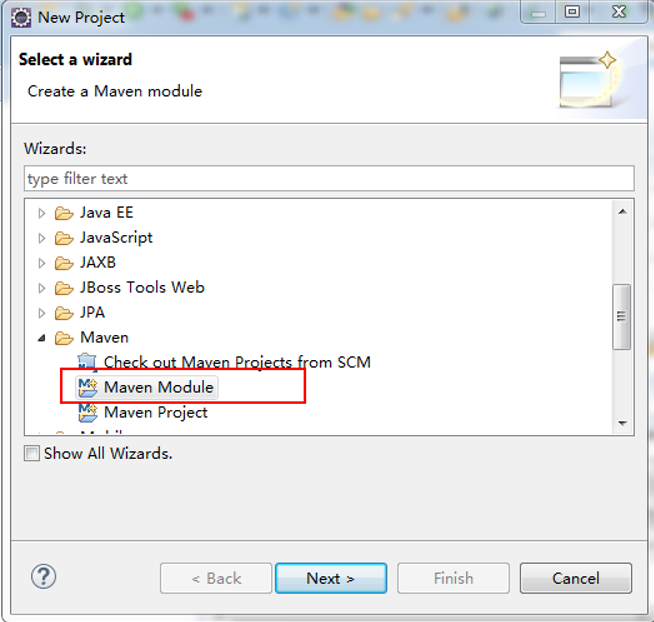
点next进入如下图
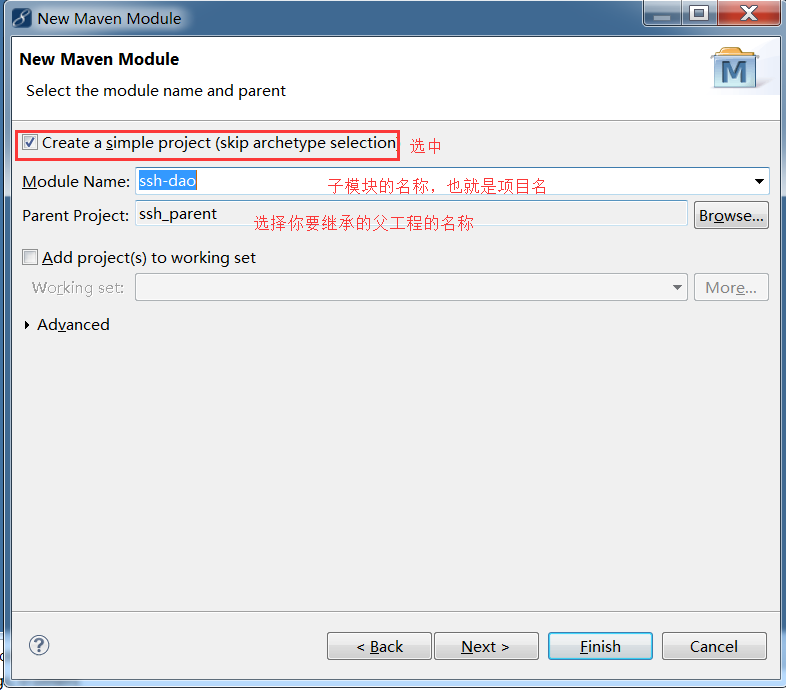
点击next,如下图

点击finish,完成,查看父工程中的pom.xml文件

查看ssh_dao中的pom.xml文件,会发现多了一个 parent结点,并且内部所包含的结点,其实就是父工程的坐标

查看ssh_dao的目录结构

因为是在dao层,和数据库打交道,那么就在这个项目中,需要配置hibernate.hbm.xml和hibernate.cfg.xml,但是又集成了spring,所以hibernate.cfg.xml就不需要了,添加applicationContext.xml即可(这里需要有spring整合hibernate的基础)
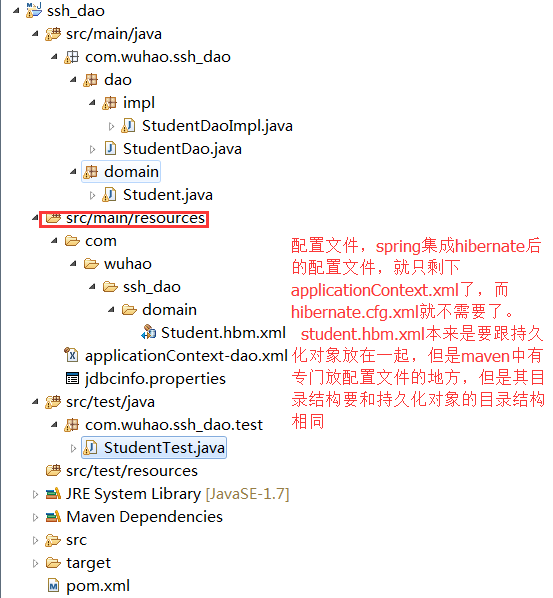
注意:将applicationContext.xml拆分出一个applicationContext-dao.xml,此文件中只配置dao

<?xml version="1.0" encoding="UTF-8"?> <beans xmlns="http://www.springframework.org/schema/beans" xmlns:xsi="http://www.w3.org/2001/XMLSchema-instance" xmlns:aop="http://www.springframework.org/schema/aop" xmlns:tx="http://www.springframework.org/schema/tx" xmlns:context="http://www.springframework.org/schema/context" xsi:schemaLocation="http://www.springframework.org/schema/beans http://www.springframework.org/schema/beans/spring-beans.xsd http:www.springframework.org/schema/tx http:www.springframework.org/schema/tx/spring-tx.xsd http:www.springframework.org/schema/aop http:www.springframework.org/schema/aop/spring-aop.xsd http:www.springframework.org/schema/context http:www.springframework.org/schema/context/spring-context.xsd"> <!-- 1 加载properties文件 --> <context:property-placeholder location="classpath:jdbcinfo.properties"/> <!-- 2 配置数据源 --> <bean id="dataSource" class="com.mchange.v2.c3p0.ComboPooledDataSource"> <property name="driverClass" value="${jdbc.driverClass}"></property> <property name="jdbcUrl" value="${jdbc.jdbcUrl}"></property> <property name="user" value="${jdbc.user}"></property> <property name="password" value="${jdbc.password}"></property> </bean> <!-- 3 配置hibernate SessionFactory 注意:这里使用的是hibernate5,要看你使用的jar包是什么版本的,每个人不一样。--> <bean id="sessionFactory" class="org.springframework.orm.hibernate5.LocalSessionFactoryBean"> <!-- 3.1 配置数据源 * <property name="属性名" ref="另一个bean引用"> name 必须是对象的setter方法推断获得,setDataSource(...), 去掉set DataSource ,首字母小写 dataSource * ref 其他bean引用 <bean id=""> 可以任意,一般情况与上面属性名称相同。 --> <property name="dataSource" ref="dataSource"></property> <!-- 3.2 配置hibernate其他属性 * 在hibernate.cfg.xml 配置文件 “hibernate.dialect” 和 “dialect” 等效的 * 在spring配置文件中,必须使用“hibernate.dialect” --> <property name="hibernateProperties"> <props> <!-- 方言 --> <prop key="hibernate.dialect">org.hibernate.dialect.MySQL5Dialect</prop> <!-- 显示sql语句 --> <prop key="hibernate.show_sql">true</prop> <!-- 格式化sql语句 --> <prop key="hibernate.format_sql">true</prop> </props> </property> <!-- 3.3 加载映射文件 com/wuhao/ssh_dao/Student/domain/Student.hbm.xml com/wuhao/ssh_dao/xxx/domain/xxx.hbm.xml com/wuhao/ssh_dao/*/domain/*.hbm.xml <property name="mappingLocations" value="classpath:com/wuhao/ssh_dao/domain/*.hbm.xml"></property> --> <property name="mappingLocations" value="classpath:com/wuhao/ssh_dao/domain/Student.hbm.xml"></property> </bean> <!-- hibernate中通过sessionFactory创建得session对对象进行操作,spring提供一个hibernateTemplate进行操作,跟spring中的jdbcTemplate一样, 继承HibernateDaoSupport后,注入SessionFactory即可,在dao层就不用在写hibernateTemplate的set方法了。 --> <bean id="studentDao" class="com.wuhao.ssh_dao.dao.impl.StudentDaoImpl"> <property name="sessionFactory" ref="sessionFactory"></property> </bean> </beans>

jdbc.driverClass=com.mysql.jdbc.Driver jdbc.jdbcUrl=jdbc:mysql:localhost:3306/test jdbc.user=root jdbc.password=root
其他几个Student.java这些就不用看了,太简单了。
StudentTest.java这个需要讲解一下,因为这里使用junit测试的时候,会报错,报的错误是找不到junit的jar包,这里我们就会很疑惑,为什么会找不到该jar包呢,不是在父工程里面都导入了junit的jar包了吗?这里出错的原因是传递依赖的范围问题。
将父工程看做A项目(下面简称A),将该子模块ssh_dao看做B项目(下面简称B),A依赖junit的jar包是直接依赖。B继承A(实际操作就是B中填写A的坐标)也可以看成一种依赖,那么就是这样一种关系,B 依赖 A 依赖 junit, A依赖junit是直接依赖没错,那么B跟junit的关系就叫做传递(间接)依赖,我们知道A依赖的junit时,junit的jar包可以设置在A中的使用范围,就是scope属性,可以为compile,test等,而junit设置的是test,只在A中测试的时候用,那么B想用junit时,junit的作用范围是不是也是test呢?这就有一种关系。具体看表。

按照刚才上面的例子,来看看在B中,junit的作用范围是什么?首先看B 依赖 A,直接依赖,并且A在B中的作用范围是compile(没设置就默认),所以在直接依赖这一列中找到compile这一行,也就是用红色框框框起来的一行,然后B 依赖 junit,对A来说,A 是传递依赖 junit,这时候看junit设置的作用范围是多少(也就是看junit在B中的使用范围是什么)?看传递依赖这一行,junit设置的是test,找到test这一列,看相交的地方,是空的,则说明,junti在B中的test范围不能够使用,其实看图,B中任何范围内都不能够使用junit,这样你就理解了这张图是什么意思。这只是原理,实际上我们解决这种问题的时候,用一个简单粗暴的解决方案。什么jar包丢失了,我们就再次导入一次jar包即可。
所以在ssh_dao子模块的pom.xml中有junit的坐标才能使用test

2.3、创建ssh_service子模块
方法同ssh_dao模块创建方法一样,模块名称为ssh_service。
看ssh_service和ssh_parent的pom.xml文件,会出现和ssh_dao创建时一样的情况,ssh_service多出一个parents结点,ssh_parent多个一个module结点
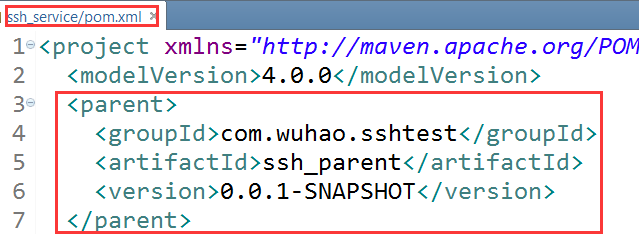

在ssh_service的pom.xml中添加两个依赖

然后编写service层的代码,
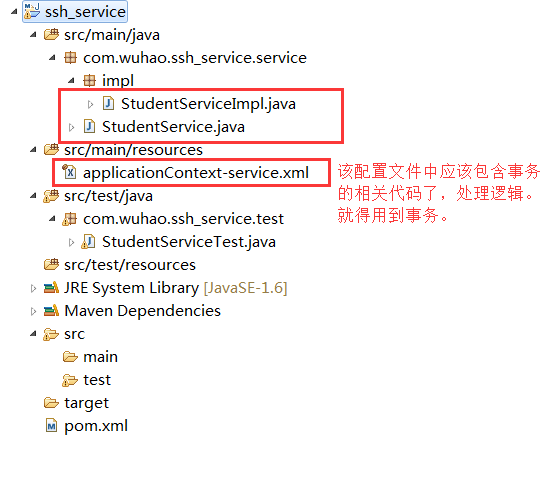
主要关注一下applicationContext-service.xml中的事务的相关代码

<?xml version="1.0" encoding="UTF-8"?> <beans xmlns="http://www.springframework.org/schema/beans"www.springframework.org/schema/context/spring-context.xsd"> <!-- 事务管理器 --> <bean id="transactionManager" class="org.springframework.orm.hibernate5.HibernateTransactionManager"> <property name="sessionFactory" ref="sessionFactory"></property> </bean> <!-- 事务通知 --> <tx:advice id="txAdvice" transaction-manager="transactionManager"> <tx:attributes> <tx:method name="save*" propagation="REQUIRED"/> <tx:method name="insert*" propagation="REQUIRED"/> <tx:method name="update*" propagation="REQUIRED"/> <tx:method name="delete*" propagation="REQUIRED"/> <tx:method name="get*" read-only="true"/> <tx:method name="*" propagation="REQUIRED"/> </tx:attributes> </tx:advice> <!-- aop --> <aop:config> <aop:pointcut id="pointcut" expression="execution(* cn.wuhao.ssh_service.service.impl.*.*(..))" /> <aop:advisor advice-ref="txAdvice" pointcut-ref="pointcut" /> </aop:config> <!-- 在StudentService中注入StudentDao --> <bean id="studentService" class="com.wuhao.ssh_service.service.impl.StudentServiceImpl"> <property name="studentDao" ref="studentDao"></property> </bean> </beans>
该层的测试,需要将ssh_dao中的applicationContext-dao.xml将ssh_service的applicationContext-service.xml包含进去才能够实验的通。这里不做测试,
2.4、创建ssh_web子模块
方法同maven-dao模块创建方法,模块名称为ssh-web,注意:打包方式为war,而不再是jar包了,因为该层需要放到tomcat中去。与浏览器交互,就是web项目了,所以打成war包
和前面一样,ssh_parent的pom.xml中增加一个module结点,而ssh_web的pom.xml中增加一个parent结点
这个也很简单,就是跟写普通的struts2是一样的,只不过是和spring的结合,有什么对象,都通过spring来给予,并且这里多做一个事情,就是将之前的applicationContext配置文件进行结合,看下图


<?xml version="1.0" encoding="UTF-8"?> <beans xmlns="http://www.springframework.org/schema/beans" xmlns:xsi="http://www.w3.org/2001/XMLSchema-instance" xmlns:p="http://www.springframework.org/schema/p" xmlns:context="http://www.springframework.org/schema/context" xmlns:tx="http://www.springframework.org/schema/tx" xmlns:aop="http://www.springframework.org/schema/aop" xsi:schemaLocation="http://www.springframework.org/schema/beans http:www.springframework.org/schema/beans/spring-beans.xsd http:www.springframework.org/schema/aop http:www.springframework.org/schema/aop/spring-aop.xsd http:www.springframework.org/schema/tx http:www.springframework.org/schema/tx/spring-tx.xsd http:www.springframework.org/schema/context http:www.springframework.org/schema/context/spring-context.xsd"> <import resource="classpath:applicationContext-dao"/> <import resource="classpath:applicationContext-service"/> <import resource="classpath:applicationContext-web"/> </beans>
web.xml中配置struts2的拦截器和spring的监听器

<?xml version="1.0" encoding="UTF-8"?> <web-app xmlns:xsi="http://www.w3.org/2001/XMLSchema-instance" xmlns="http://java.sun.com/xml/ns/javaee" xsi:schemaLocation="http://java.sun.com/xml/ns/javaee http://java.sun.com/xml/ns/javaee/web-app_2_5.xsd" id="WebApp_ID" version="2.5"> <!--spring配置文件的加载的监听 器--> <context-param> <param-name>contextConfigLocation</param-name> <param-value>classpath:applicationContext.xml</param-value> </context-param> <listener> <listener-class>org.springframework.web.context.ContextLoaderListener</listener-class> </listener> <!--2.懒加载 OpenSessionInviewFilter noSession or session is closed--> <filter> <filter-name>openSessionInViewFilter</filter-name> <filter-class>org.springframework.orm.hibernate5.support.OpenSessionInViewFilter</filter-class> <init-param> <param-name>singleSession</param-name> <param-value>true</param-value> </init-param> <init-param> <param-name>sessionFactoryBeanName</param-name> <param-value>sessionFactory</param-value> </init-param> </filter> <filter-mapping> <filter-name>openSessionInViewFilter</filter-name> <url-pattern></url-pattern> </filter-mapping> <!--3.struts2核心控制器--> <filter> <filter-name>struts2</filter-name> <filter-class>org.apache.struts2.dispatcher.ng.filter.StrutsPrepareAndExecuteFilter</filter-class> </filter> <filter-mapping> <filter-name>struts2</filter-name> <url-pattern>/*</url-pattern> </filter-mapping> </web-app>
这里注意一个问题,struts跟spring整合的时候,Struts.xml中的class应该填写spring配置文件中的id。
2.5、总结与启动
父工程和子模块都写完之后,就成这样了

运行调试即可。这里我遇到一个小问题,一直解决不了,
三、总结
理解了这个分模块与聚合的作用,并且知道如何开发即可。加油。确实搞的有点烦躁。
版权声明:本文内容由互联网用户自发贡献,该文观点与技术仅代表作者本人。本站仅提供信息存储空间服务,不拥有所有权,不承担相关法律责任。如发现本站有涉嫌侵权/违法违规的内容, 请发送邮件至 dio@foxmail.com 举报,一经查实,本站将立刻删除。


